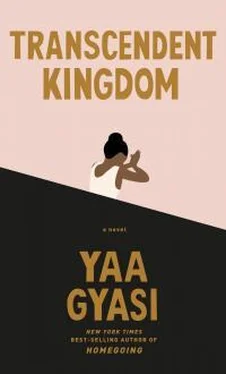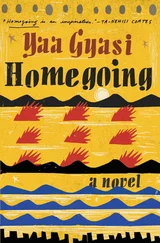We walked to the Greyhound station, our mother holding our hands the entire time. We took that bus home, and I don’t think Nana made a single noise. I don’t think I did either. I could feel that something had changed among the three of us and I was trying to learn what my role in this new configuration of my family might be. That day was the end of my naughtiness, the beginning of my good years. If our mother was angry or upset at us, me for being a terror, Nana for changing his mind, she didn’t let on. She wrapped us up in her arms during that long ride home, her face inscrutable. When we got home, she put all of Nana’s soccer gear into a box, sealed the box, and dumped it into the nether regions of our garage, never to be seen again.
16
I asked Katherine to lunch at the little Thai restaurant in the basement of the psychology building. I ordered from the brusque woman, who could sometimes make eating there feel like a punishment despite how good the food was, and wandered out to sit in the courtyard while I waited for Katherine to arrive. It was a sunny, beautiful day. The kind of day I often took for granted living in a place where the beauty of the school, of nature, seemed to come so effortlessly. This was in stark contrast to my time on the East Coast, where beauty was hard won, where every brilliant day had to be savored, the memories of them stored like acorns buried underground by industrious squirrels, just to get you through those punishing winters. That first winter in Massachusetts, with snow piled up to my knees, I’d missed Alabama with an intensity I hadn’t thought possible. I craved heat and light the way other people craved coffee and cigarettes. Sick and sluggish, I got a SAD lamp from mental health services and sat staring at it for hours, hoping it would fool me into believing I was back in the place where I assume my ancestors first instilled this need for warmth—in Ghana on a beach just above the equator.
Katherine was half an hour late. I started eating and watched two undergrads argue in front of the bike stand across the way. It was clear they were a couple. One of the women circled her U-lock around her wrist while the other woman shouted, “I have a PSET due at three, Tiffany. You know that.” Tiffany didn’t seem to know, or maybe she just didn’t care. She was on her bike, zooming off within seconds, and the other woman just stood there, stunned. She looked around, trying to see if the fight had had any witnesses. I should have looked away, given her some privacy in her embarrassment, but I didn’t. We made eye contact, and her face grew so red I could almost feel the heat coming off of it. I smiled at her, but that only seemed to make her feel worse. I remembered what it was like to be that age, so aware of yourself and the theater of your private little shames. “I have my shit too,” I wanted to say. “I have worse shit than a PSET due at three, worse shit than Tiffany, even.” She narrowed her eyes at me as though she’d heard my thoughts, and then she stormed off.
Katherine finally arrived. “Sorry, sorry,” she said, slipping into the seat across from me. “The Caltrain just decided to stop running for some reason.”
Even in that haggard, breathless state, she looked beautiful. Long black hair piled messily on the top of her head, those braces-straight teeth—a telltale sign of someone who’d grown up with money and attention. They gleamed brilliant every time she smiled. I glanced at her stomach. Nothing. “That’s okay,” I said, and then I clammed up. I had invited Katherine on the pretense that I wanted to talk about our work. There were so few women in our field, and though it was important to have role models and mentors, I had done very little to connect with the other women in my department. I was the typical graduate student, clambering for the attentions of the hotshot male scientists, the ones who had discovered this thing, won that award. I wanted my name spoken in the same breath as theirs, my work written about in the same journals. Katherine, brilliant though she was, liked to wear a sweatshirt with the word STEMINIST splashed across the front. Every year, she manned a booth at the undergraduate career fair for women considering a career in science. When she’d asked me, my first week at Stanford, if I wanted to join the Women in STEM group she led, I’d said no without a second thought. I’d had a professor in college laugh when I asked if he’d be my advisor the year I declared my major. True, I had never taken a class with him, and true, he was the preeminent microbiologist on campus, but still, in that split second of laughter before he caught himself and said, “Why sure, dear,” I’d wanted nothing more than to turn into dust, to sink into the ground and disappear forever. I didn’t want to be thought of as a woman in science, a black woman in science. I wanted to be thought of as a scientist, full stop, and it mystified me that Katherine, whose work was published in the best journals, was content to draw attention to the fact of her womanhood. Even this question of a baby, of the little ovulation “o’s” her husband had snuck into his calendar just at the moment when Katherine’s career was set to take off, was itself a reminder of the millstone of womanhood we wore around our necks.
I didn’t want to wear mine, and I wasn’t really interested in talking to Katherine about the research that she was doing. What I wanted to talk about was my mother, her sleepy breath hum and weight loss, her vacant eyes, her sloping back. My dinnertime visits had done nothing to draw her out. After three days, I’d given up that tack and tried a different one. I called Pastor John and held the phone to my mother’s ear while he prayed.
“Father God, we ask that you rouse this woman from her slumber,” he said. “Jesus, we pray that you lift her spirits. Remind her that all of her crosses belong to you.”
He kept going like this for some time, and my hand started to shake as I held the phone. I might as well have been casting spells over her for all the good this was doing. After he had finished, I hung up and slumped down onto the edge of the bed, sunk my head into my hands. I wanted to cry but I couldn’t. Behind me, my mother’s breath continued its hum. The sound reminded me of the video of the black mamba I’d watched when I was a child, even though that snake hadn’t made a sound. The hum was the only lively thing about my mother, and so I’d come to be grateful for it, whatever it was.
What was the ethical thing to do? Was it right of me to let her stay in that bed courting death, practicing for it, even? I turned this question over in my head every day, playing out the possible scenarios, the things I could do, should do. I knew the statutes for involuntary commitment in California, and my mother didn’t meet those burdens. She wasn’t threatening to hurt herself or anyone else. She wasn’t hearing voices or having visions. She was eating, though only sporadically and only when she knew I wouldn’t be home to see her do it. It had only been a week, but the days dragged on, weighed on me. She told me she was “tired” and that she needed “rest.” I’d heard that before, but every time I thought of getting someone to intervene I thought of the last time and my courage failed me. The last time, when she’d gotten out of the hospital after her commitment, she’d looked at me and said, “Never again,” and I knew what she meant.
I should have said all of this to Katherine. She was a great doctor, an empathetic person, but when I tried to broach the topic of my mother, my words turned to ashes in my mouth.
“Are you all right, Gifty?” Katherine asked.
She was giving me what must have been her psychiatrist’s stare, intense and questioning. I couldn’t hold her gaze.
Читать дальше












